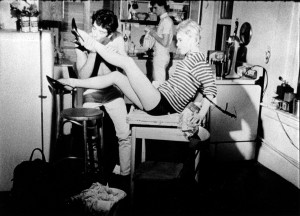Kitchen
Andy Warhol’s Kitchen
Warhol said to me, ‘I want several things this time. First, I want a vehicle for Edie Sedgwick. We’re going to make her our Superstar. She will be the queen of the Factory, and I want it in a kitchen because I want, now, white. Completely white… I want this one more involved than any of the previous ones.’ So, I said, ‘So you want a plot?! said I in complete amazement, and then, he said, ‘No , I don’t want a plot, but I want a situation or situations.’ I said, ‘Okay.’ And then, I brought him the script, and… I think he read it right there and said, ‘This is the best thing you’ve done.’ I don’t think so, but as a film – it was clearly the most developed as a play. And then he wanted to direct it. So, we really co-directed it, and this was the first time. I mean, he sat and rehearsed it. He was very interested clearly in her, and this was a break for her.
— Ronny Tavel
I think Warhol’s films are historical documents. One hundred years from now they will look at Kitchen and see that incredibly cramped little set, which was indeed a kitchen; maybe it was eight feet wide, maybe it was six feet wide. It was photographed from a middle distance in a long, low medium shot, so it looked even narrower than that. You can see nothing but the kitchen table, the refrigerator, the stove, and the actors. The refrigerator hummed and droned on the sound track. Edie had the sniffles. She had a dreadful cold. She had one of those colds you get spending the long winter in a cold-water flat. The dialogue was dull and bounced off the enamel and plastic surfaces. It was a horror to watch. It captured the essence of every boring, dead day one’s ever had in a city, a time when everything is imbued with the odor of damp washcloths and old drains. I suspect that a hundred years from now people will look at Kitchen and say, ‘Yes, that is the way it was in the late Fifties, early Sixties in America. That’s why they had the war in Vietnam. That’s why the rivers were getting polluted. That’s why there was typological glut. That’s why the horror came down. That’s why the plague was on its way.’ Kitchen shows that better than any other work of that time.
— Norman Mailer
Kitchen was fun. It was kind of confusing. Ronny wanted me to learn lines of dialog. But Chuck thought that was a bad idea and he wanted me to not learn them. Why am I always the yo-yo in the middle? Anyway, we hid scripts around the kitchen set and if I didn’t know a line I’d sneeze. I sneezed a lot. It was kind of funny.
Shot about May 30, 1965.
- Warholstars.org / Kitchen, 1965
- Kitchen / IMDB



No comments yet. Be the first!